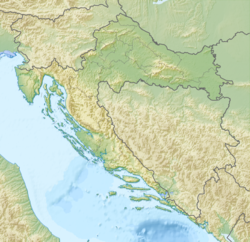Sokol (lit. 'Falcon') is the name of a medieval fortress located in the village of Dunave in Konavle, Croatia, underneath the eastern slopes of Sniježnica, near the border with Sutorina in Montenegro. It's also referred to as Sokol grad or Sokol kula.
| Sokol | |
|---|---|
| Dunave, Konavle, Croatia | |
 | |
| Coordinates | 42°32′31″N 18°24′32″E / 42.542°N 18.409°E |
| Type | fortress |
| Site history | |
| Built for | Zahumlje, Republic of Ragusa |
| In use | 14th–17th century |
| Materials | Limestone |
Arthur J. Evans is known to have done excavations on the site, but never published complete results. Archaeologists have been conducting surveys of the site since the 1970s, and it is known that the site was inhabited in the Eneolithic, Bronze and Iron Ages, most notably by the Cetina culture.[1] The site was also inhabited during Roman times, growing in importance as part of a Byzantine limes.[2]
It is not known exactly when the medieval Fort Sokol was built, the first historical records about it date to a mention in 1373 and also a mention in the 1391 donation of Konavle by the Sanković family to the Republic of Ragusa. It was garrisoned by Dubrovnik and commanded by a member of the gentry until it was abandoned in 1672.[3]
The site also contains a medieval stećak necropolis as well as a Glagolitic marble inscription.[4]
References
edit- ^ Topić et al 2019, pp. 116–117.
- ^ Topić et al 2019, pp. 112–113.
- ^ Topić et al 2019, p. 115.
- ^ Topić et al 2019, p. 116.
Sources
edit- Topić, Nikolina; Bedić, Željka; Vyroubal, Vlasta; Šlaus, Mario; Barešić, Jadranka; Sironić, Andreja; Iklić, Mato; Moore, Andrew M. T.; Drašković Vlašić, Nikolina (2019). "Inventory of Finds and Multiphase Cemetery by Fort Sokol in Konavle". Archaeologia Adriatica. 13 (1). University of Zadar. ISSN 1848-9281.
